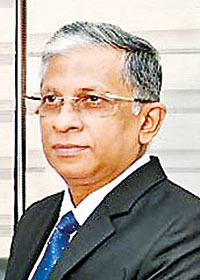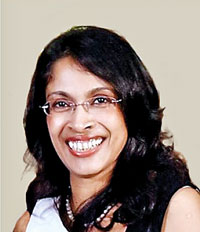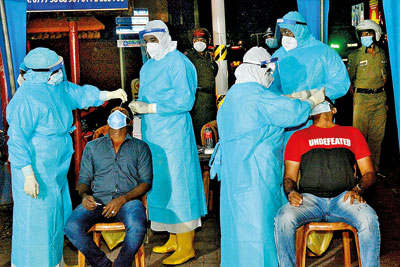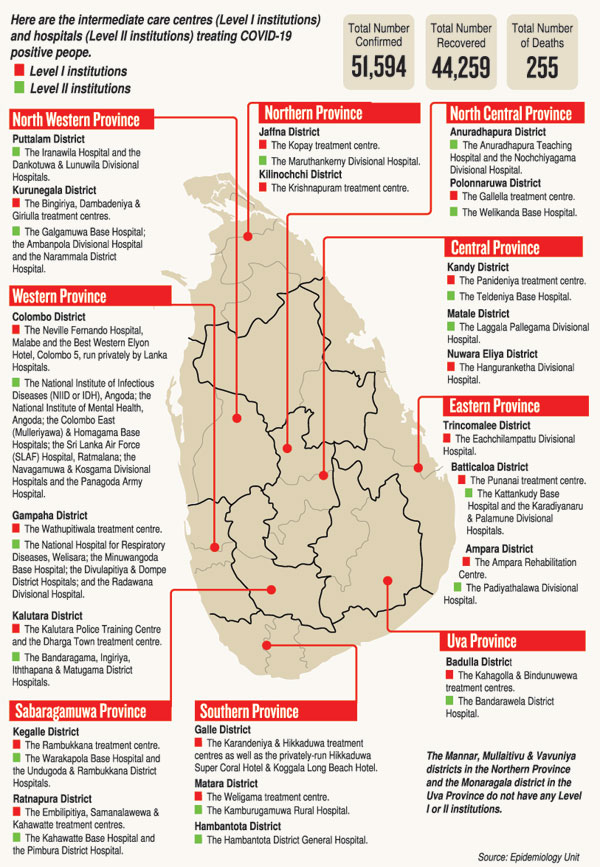News
Airports to open for tourists on January 21
The airports will open for tourists on Thursday (January 21), under health guidelines, the Sunday Times learns.
A high-level health official said that the airports would not be open for any other passengers except tourists, while repatriation flights will continue as scheduled.

Dr. Asela Gunawardena
Explaining the protocols that would be followed, the Director-General (DG) of Health Services, Dr. Asela Gunawardena told the Sunday Times that the tourists who come in will be subjected to RT-PCR testing at the hotel and if negative sent in a strict bio-secure bubble along with their family or group to designated hotels and places with designated drivers. The hotel staff too will be in a bio-secure bubble.
“The tourists will not have contact with the public. The same applies to the hotel staff who will not be allowed to leave the hotel during the stay of these tourists. Once the tourists leave, the hotel staff will undergo a 14-day quarantine period before going into the community,” he said.
The tourists, meanwhile, will undergo further RT-PCR testing on the 7th and 14th day of their stay and if those are also negative (altogether three tests), they would be allowed to go elsewhere in the country if they wish to do so, it is understood.
The DG said that all these guidelines have been sent to the relevant stakeholders including the Provincial and Regional Directors of Health (PDHs & RDHs) and the Medical Officers of Health (MOHs) who would inform the Public Health Inspectors (PHIs).
When asked about the pilot project which brought in Ukranian tourists which had disastrous results, he said that the irresponsible behaviour of a few people involved in the project who paid scant regard to health guidelines led to this regrettable situation. The tourism authorities were sidelined and protested vehemently.
“Now the measures have been tightened. All details with regard to tourists (names, travel times, vehicle numbers etc.) have to be sent to the MOHs in advance. We are not expecting the MOHs or the PHIs to shadow them all the time but keep an eye on them, with each and every one involved in this programme acting with responsibility for the national good,” stressed Dr. Gunawardena, underscoring that the health of the people of Sri Lanka is of paramount importance.
New strain in Sri Lanka despite “bio-secure” bubble
“The new strain (variant) of the coronavirus found in the United Kingdom has come to Sri Lanka from abroad but there is absolutely no threat to the people of our country,” assured Dr. Gunawardena.
He said that the foreigner who was detected with the new variant is in extended quarantine for 28 days, while all his close associates have been tested both with RT-PCR and Rapid Antigen Tests and found to be negative.
The DG added: “We are wondering how the foreigner could have contracted the virus when he was in a bio-secure bubble.”
ICU capacities
Meanwhile, on a different note, when asked about concerns over whether Sri Lanka has adequate beds in Intensive Care Units (ICUs), Dr. Gunawardena said that they do have, but if the beds in Colombo fill up, they are looking to mobilizing beds at Teldeniya and Anuradhapura Hospitals.
Vaccines
Sri Lanka is working with the Indian government to secure vaccines for 1% of its eligible population, it is learnt.
Dr. Gunawardena said that they are hoping to secure this stock from the AstraZeneca vaccine being manufactured by the Serum Institute of India. These vaccines would be administered to frontline health workers and others in the frontline. When the first stocks would arrive in the country would be difficult to say, as extensive discussions are ongoing.
With regard to the vaccines for 20% of the eligible population through COVAX, he said that it would all depend on vaccine availability, while it certainly may be a mix of vaccines that Sri Lanka would be able to secure either through COVAX or bilaterally. There is no timeline for the COVAX vaccines but it may be June-July.
COVAX (COVID-19 Vaccine Global Access) is a global initiative which works with vaccine manufacturers to provide countries worldwide equitable access to safe and effective vaccines once they are approved and licensed. It is co-led by GAVI (the Vaccine Alliance), the Coalition for Epidemic Preparedness Innovations (CEPI) and the World Health Organization (WHO).
“Leaving out children and expectant mothers who are about 25-30% (and not eligible) of the population, we are hoping to vaccinate around 50% of the population along with the vaccines for 20% of the population from COVAX,” he added.
Meanwhile, when contacted, the Chairperson of the National Medicines Regulatory Authority (NMRA) Prof. Asita de Silva said that they had not received any applications for the registration of vaccines yet “but we expect some soon”.
| J’ Pura to perform sequencing every 2 weeks to catch any new strain or mutation of virus  Prof. Neelika Malavige The highly contagious new variant (B.1.1.7) emerging from the United Kingdom (UK) was identified in a foreigner who arrived in Sri Lanka through genetic sequencing carried out by the Department of Immunology & Molecular Medicine of the University of Sri Jayewardenepura. This variant is one of four doing the rounds across the globe. The others have emerged from South Africa, Brazil and Japan. Explaining that the Department of Immunology & Molecular Medicine has two genetic sequencing machines for large and small numbers of samples, its Head Prof. Neelika Malavige said that all SARS-CoV-2 viruses they have sequenced, including the new UK variant recently identified by them, are deposited in the Nextstrain viral sequence resource centre. “All sequencing laboratories deposit their sequences on this open database for scientists around the world to monitor the viral variants in different countries and understand what is happening in each country,” she added. Prof. Malavige’s laboratory is hoping to perform sequencing every two weeks to catch any new strain which may come into Sri Lanka as well as any mutation of the virus that may occur within the country. |
|
 Buses heading to the north on Wednesday night were stopped on Marine Drive and antigen tests were carried out on passengers going home for Thai Pongal. Pic by Indika Handuwala Health Ministry reviewing prevention and control of COVID-19 The Health Ministry is currently reviewing the strategy of prevention and control of COVID-19 in the country within the past year, Deputy Director General, Public Health Services I, Dr. Hemantha Herath told the Sunday Times last morning. “We are carrying out an exhaustive review process and are looking into probable options of change,” he said, preparing to attend the third such meeting yesterday. Of the scheduled five meetings all attended by high-level officials of the ministry including the Director-General, the last two are to be held shortly. Thereafter, the findings and probable options on how to deal with COVID-19 will be placed before a wider forum of experts from outside the Health Ministry before the end of January, he said, adding that such reviews are essential. Currently, though the number of people who are being tested positive for COVID-19 is small for a given Medical Officer of Health (MOH) area, these numbers are spread across many MOH areas, it is learnt. Concerns over use of masks with exhalation valves Many health experts have expressed serious concerns over the use of masks with exhalation valves or vents by the public as a protection against the new coronavirus. The World Health Organization (WHO) advises that in areas of known or suspected community or cluster SARS-CoV-2 transmission (Sri Lanka is at Alert Level 3 of cluster-based infections), the public should wear a non-medical mask indoors (shops, shared workplaces, schools etc.) or outdoor settings where physical distancing of at least 1 metre cannot be maintained. Meanwhile, the Centers for Disease Control and Prevention (CDC) of the United States of America recommends the use of non-medical disposable masks (single-use masks). The CDC does not recommend the use of masks with exhalation valves or vents because this type of mask may not prevent a person from spreading COVID-19 to others. The hole in the material may allow respiratory droplets to escape and reach others. Research on the effectiveness of these types of masks is ongoing, the CDC adds.
AASL Chairman assures guidelines will be followed strictly There will be no negligence from the side of the airport, assured Airport and Aviation Services Limited (AASL) Chairman, Major General (Retd.) G.A. Chandrasiri, as Sri Lanka readies itself to reopen both the Bandaranaike International Airport (BIA), Katunayake, and the Mattala Rajapaksa International Airport (MRIA) for tourists next Thursday (January 21). “A specific programme is in place and it will be followed, with operations being launched at midnight on Wednesday (January 20),” he said. The Sunday Times learns that the two airports are expected to get 3,300 passengers per day inclusive of those arriving on repatriation, cargo, charter and transit flights. Mr. Chandrasiri said that while this number will include about 750 repatriates per day (there were only 300-400 this week at the BIA and the MRIA), the others will be tourists from around the world except the United Kingdom (UK). Explaining the arrangements, he said that the repatriates will be sent into 14 days of quarantine at a state centre or designated hotel, depending on their choice. “Under the other category will be ‘tourists’ which would also include passengers coming in for commercial purposes and other programmes. They would be handled by the Sri Lanka Tourism Development Authority (SLTDA) and come under different procedures than the repatriates. They would be in a bio-secure bubble and will be taken to hotels,” said the AASL Chairman. He said that the tourists should arrive with an RT-PCR negative report taken 96 hours prior, while undergoing testing on Day 1, Day 5 and then Day 14. All airport staff coming into contact with the tourists will wear Personal Protective Equipment (PPE), said Mr. Chandrasiri, adding that currently four BIA staff members, comprising the Airport Manager and three from the Fire Unit, have tested positive for COVID-19 and are receiving treatment. They had contracted the virus from outside the airport.
What happens if you test positive for COVID-19? DG gives clear picture of procedure and facilities at both state and private sector institutions With many people requesting the Sunday Times to give a clear picture of the procedures with regard to hospitalization and quarantining, here is what Director-General Dr. Asela Gunawardena says: If you test positive for COVID-19:
Once you test positive, what happens to your close (first) contacts:
An intermediate care centre being run by a private hospital The Health Ministry has granted permission to Lanka Hospitals at Narahenpita to run an intermediate care centre at a 60-room hotel just up the road from its location at Colombo 5. The COVID-19 positive people sent there are being looked after by the medical and nursing staff of Lanka Hospitals. The food is being prepared by the hotel staff but they have no contact with the patients, it is learnt. An intermediate care centre being run by the army This is while the army is running an intermediate care centre at a 100-room beach hotel, close to Galle. Here too, while the staff prepares the food, the food is kept at the door of the patients while other logistics are being run by the army. The Sunday Times understands that the army may turn more hotels into intermediate care centres. Procedures followed when a person turns positive Setting down the procedure, Dr. Gunawardena says that when a person tests positive, either at a state or private laboratory, the laboratory mandatorily informs the Epidemiology Unit. COVID-19 is a notifiable disease. The Epidemiology Unit, in turn, informs the Operations Centre of the Health Ministry which is the central coordinating mechanism. Then the Ops Centre informs the Regional Epidemiologist and the MOH of the area from which the positive case has been found where the person is to be taken. This would be based on bed-availability and also taking into account the person’s gender and whether others in the family (like babies) have to be considered and the choice of the person whether he/she prefers state or private facilities. “Thereafter, arrangements are made to transport these people either in ambulances available at regional level, hired vehicles or buses provided by the army which is a great source of strength,” the DG explains. He says that if there are large numbers and there is an overload in the system, there could be a delay, as the ambulances transport only about six people in one go. “However, more than 90% of people who test positive are taken to the respective hospital or intermediate care centre within 24 hours,” he assures. With regard to poor facilities at some hospitals and intermediate care centres, Dr. Gunawardena says that he did visit the Punani centre two weeks ago. “I won’t say that the facilities are 100% optimal because there are a large number of people accommodated, but we are trying our best in challenging circumstances,” he said, adding that it is the largest centre accommodating around 600-700 people. When asked about running water, he said that there is pipe-borne water but the centre is located in an arid area. Sometimes the people too are very careless and every day the taps are broken. Do you know that there is a dedicated pippa baas (plumber) 24 hours a day? Referring to complaints that the Sunday Times has heard that a treatment centre on the northwestern coast where the women’s section has only one bathroom for about 30 people, the DG said he had not received such a complaint. “I will look into it,” he assured, pointing out that all facilities may not be equal and ideal. The health authorities are making a huge effort to give the best to a large number of people but all such centres may not be geared similarly in these difficult times. | |
 |

